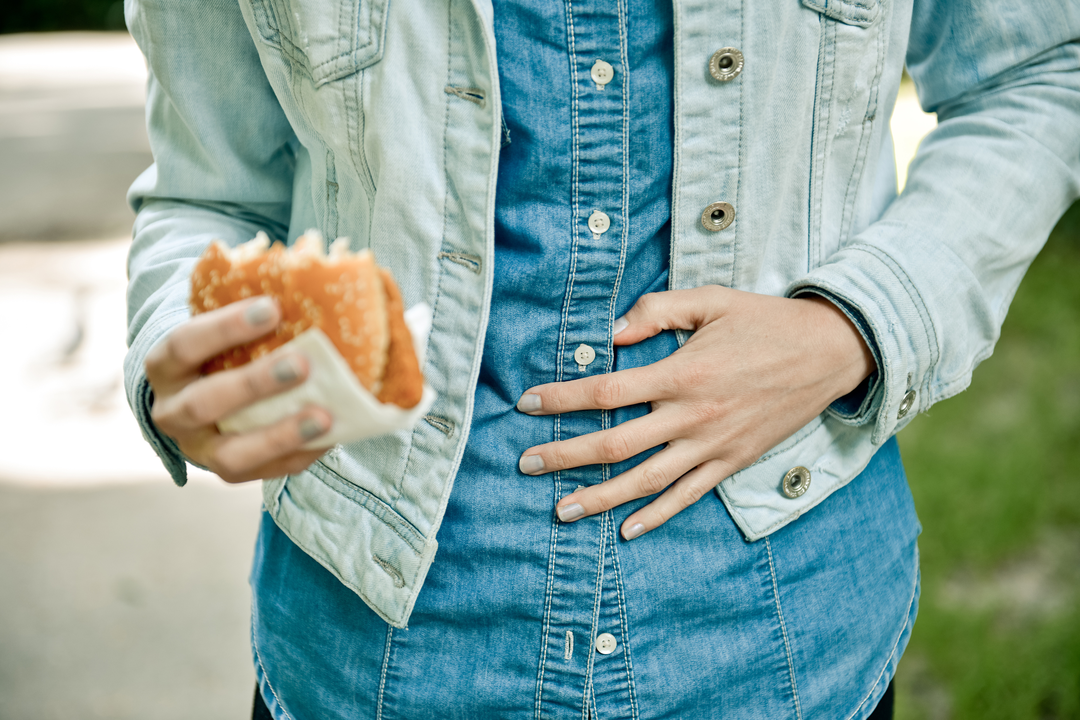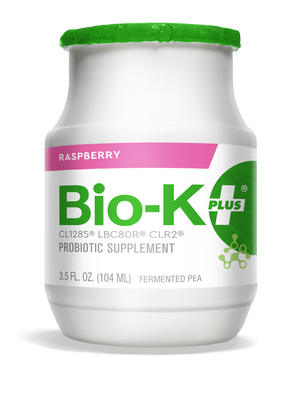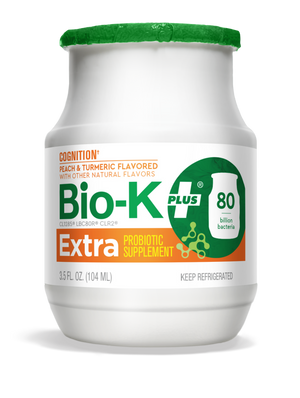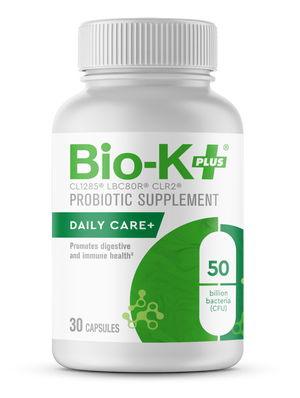How A Troubled Gut Impacts Your Mood
For many of us, this time of year can be emotionally challenging. With the festive light of the holidays now long gone, the dark, cold winter months that lie ahead can trigger seasonal feelings of depression and sadness. Pointing fingers at the lack of sun and warmth seem obvious for our shift in mood, but new research has highlighted the important role of our gut-brain axis in the appearance, reduction, or worsening of the signs and symptoms associated with depression.
Your Second Brain
The human gut is considered to be our second brain. Home to between 200-500 million neurons, our gut produces neurotransmitters (aka chemical messengers), that travel to our brain cells via the vagus nerve and bloodstream. In fact, 95% of the body’s serotonin, known more colloquially as the ‘happy hormone’, is produced in the human gut. This is along with other signalling molecules such as dopamine (the ‘motivation’ hormone), nitric oxide (a potent vasodilator), and norepinephrine (the ‘stress’ hormone).
Consequently, our mood and gut health are closely linked to one another. As microbiologists and immunologists Erica and Justin Sonnenberg explain, the gut and the brain communicate with one another in a two-way communication: "The chemical compounds secreted by the microbiota can affect mood and [...] mood itself can also affect the microbiota.”
Dysbiosis: An Unbalanced Gut
With a better understanding of the relationship between our gut bacteria and mental health, it is important to know the factors that can disrupt our bacterial balance. Science now acknowledges that gut microbiota (all living microorganisms found in the digestive tract) plays a role in many functions including digestion, the production of metabolites (vitamin B, vitamin K, antioxidants, etc.), the protection of the intestines against pathogenic elements, and the education of the immune system. Furthermore, microbiota is also involved in the phenomena of food tolerance, intestinal permeability, and several nervous system effects.
Gut dysbiosis refers to an imbalance in our microbiota that occurs when our normal gut flora becomes dominated by unfavorable species of bacteria, yeasts, or viruses. A variety of things can interfere with this balance including repeated use of antibiotics and proton pump inhibitors (antacids), type of childbirth (vaginal or cesarean section), hygiene levels, genetics, and poor nutrition.
When gut dysbiosis occurs, the outcomes can vary from individual to individual. Some people may experience a higher occurrence of inflammatory diseases, others a higher BMI (body mass index) and difficulty losing weight, while others may experience autoimmune diseases, allergies, intestinal problems, or depression and anxiety symptoms.
Dysbiosis & Depression
A person’s gut bacteria and depression symptoms can also be related. There are a few ways that dysbiosis can increase symptoms of depression. First, disturbances in our microbiota can lead to malabsorption of nutrients and a decrease in metabolite synthesis, including the production of B vitamins, a family of nutrients that are linked to a multitude of functions in the brain and nervous system. While all B-vitamins play their own important role, four B-vitamins in particular (vitamins B6, B12, B3 (niacin) and folic acid) are critical to the methylation process, which is vital for the production of almost all neurotransmitters, including serotonin.
Previous studies have shown that people suffering from depression also have high levels of inflammatory markers when compared to people who are not depressed. Dysbiosis in the gut may contribute to depressive symptoms via chronic, low-grade inflammation. Specific gut bacteria (that are not overly prevalent in a healthy digestive tract), produce molecules known as lipopolysaccharides (LPS). These LPS trigger pro-inflammatory cascades, increasing the intestinal permeability (aka leaky gut) and thus enable the entry of undesirable molecules (including LPS) into the bloodstream, paving the way for our immune system to fire, and chronic inflammation to ensue.
Take Care of Your Microbiota
A healthy microbiota plays a role in mood support, mental health and thus better stress management. Creating a healthy gut means ensuring we have a variety of bacteria, in adequate quantities to colonize the gastrointestinal tract.
Here are 3 valuable tips that can be integrated into your lifestyle, to optimize your gut flora:
1. Consume a high-quality probiotic supplement daily.
Probiotics have the potential to supplement missing microbial functions and give us access to essential nutrients. Look for a probiotic supplement that contains live bacteria in sufficient quantities to colonize the gut. You should also be sure to choose a formula that is supported by finished product research. This means looking for a product that has the science to back the efficacy of its unique formula, not just the individual strains. Lastly, ensure the bacteria strains of your probiotics can pass through the stomach’s acid barrier. Look for highly-resistant probiotic strains, fermented products, bacteria protection by a powerful and nourishing substrate, or capsules that guarantee targeted-release technology. The important thing is to consume a high-quality probiotic, containing strains of probiotic bacteria that work synergistically together.
2. Increase your daily fiber intake.
Plan to eat half a plate of vegetables at mealtimes and incorporate fresh fruit, whole grain products, pulses, and a handful of nuts and seeds into your diet to increase your daily fiber intake. Fiber is the preferred energy substrate of beneficial bacteria and gives them the nourishment they need to do their job well.
3. Add fermented foods to your diet.
Fermented foods are among the 2020 dietary trends. The fermentation process enables better absorption of the nutrients found in foods. Extremely rich in living bacteria, there are many benefits of fermented foods. They promote the work between these newly absorbed microorganisms and our own bacteria, thus potentiating their actions and the balance of our microbiota. Miso, tempeh, sauerkraut, and kimchi are some excellent examples. Probiotic drinks are another great source of fermented foods. The various flavors offered have a base made of fermented milk, organic fermented rice, fermented pea or fermented soy.
In these northern climates, there is not much we can do to change the cold temperatures and long dark nights of winter, but understanding the connection between our gut and mood can help us take the steps needed to become more resilient towards symptoms of depression.
Do you have any other questions concerning the health of your gut microbiota?
Let us know in the comments below! Join our community for more healthy tips. Click here to find a store near you. Contact us or follow us on Facebook or Instagram.
This information is for educational purposes only. If you or someone you know is suffering from depression, we encourage you to work with your healthcare practitioner to find a solution that is right for you.
References
Sonnenburg, E. et, Sonnenburg, J. (2016). L’étonnant pouvoir du microbiote, Montréal, Éditions Édito, p. 152.
Desautels-Marissal, M. (2016). Mille milliards d’amies: comprendre et nourrir son microbiome. Montréal, Éditions Cardinal.
Moos, WH., Faller, DV., Harpp, DN., Kanara, I., Pernokas, J., Powers, WR., Steliou, K. (2016). Microbiota and Neurological Disorders: A Gut Feeling. Biores Open Access. May 1;5(1):137-45. doi: 10.1089/biores.2016.0010.
Ohnmacht, C., Park, JH., Cording, S., Wing, JB., Atarashi, K., Obata, Y., Gaboriau-Routhiau, V., Marques R, Dulauroy S, Fedoseeva M, Busslinger M, Cerf-Bensussan N, Boneca IG, Voehringer D, Hase K, Honda K, Sakaguchi S, Eberl G. The microbiota regulates type 2 immunity through RORγt+ T cells. Science. 2015 Jul 9. pii: aac4263. [Epub ahead of print] PubMed PMID: 26160380. http://www.sciencemag.org/content/early/2015/07/08/science.aac4263.abstract
Sophie Georgin-Lavialle et autres, « Mast cells’ involvement in inflammation pathways linked to depression: evidence in mastocytosis », Molecular Psychiatry, 26 janvier 2016. doi: 10.1038/mp.2015.216
Andrew H. Miller et Charles L. Raison, « The role of inflammation in depression: from evolutionary imperative to modern treatment target », Nature Reviews Immunology, vol. 16, no 1, janvier 2016, p. 22-34. doi: 10.1038/nri.2015.5.
Naseribafrouei A, Hestad K, Avershina E, et al. Correlation between the human fecal microbiota and depression. Neurogastroenterol Motil. 2014 Aug;26(8):1155-62.
Abildgaard A, Elfving B, Hokland M, Wegener G, Lund S. Probiotic treatment reduces depressive-like behaviour in rats independently of diet.
Psychoneuroendocrinology. 2017 Feb 16;79:40-48. doi: 10.1016/j.psyneuen.2017.02.014. [Epub ahead of print]
Dash S, Clarke G, Berk M, et al. The gut microbiome and diet in psychiatry: focus on depression. Curr Opin Psychiatry. 2015; 28: 1-6. Review.
Borre YE, Moloney RD, Clark G, et al. The impact of microbiota on brain and behavior: mechanisms & therapeutic potential. Adv Exp Med Biol. 2014; 817: 373-403. Review. (Cité par Lagacé, 2016, p. 248)
De Palma G, Lynch MD, Lu J, Dang VT, Deng Y, Jury J, Umeh G, Miranda PM, Pigrau Pastor M, Sidani S, Pinto-Sanchez MI, Philip V, McLean PG, Hagelsieb MG, Surette MG, Bergonzelli GE, Verdu EF, Britz-McKibbin P, Neufeld JD, Collins SM, Bercik. P.Transplantation of fecal microbiota from patients with irritable bowel syndrome alters gut function and behavior in recipient mice. Sci Transl Med. 2017 Mar 1;9(379).





